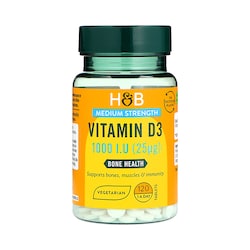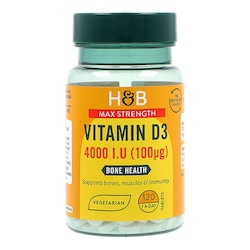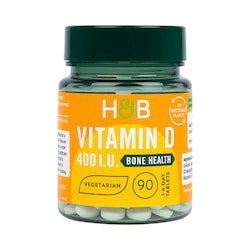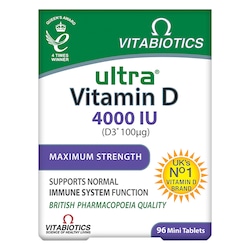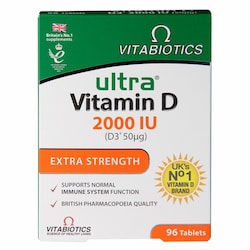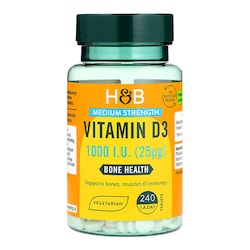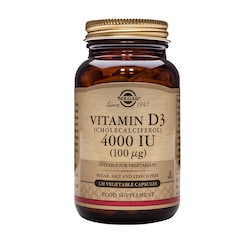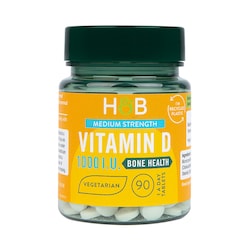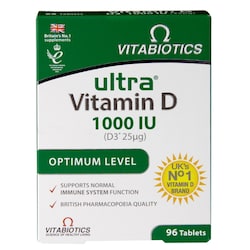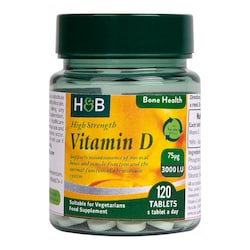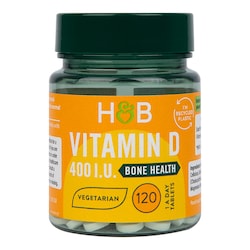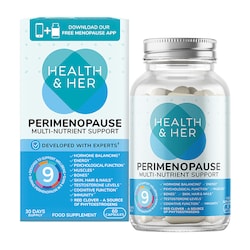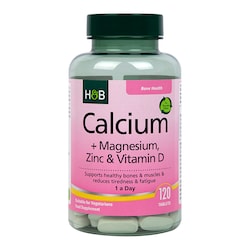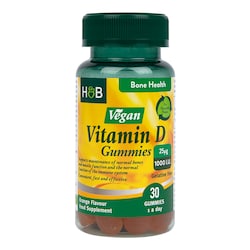20% off £30
What is vitamin D good for?

Vitamin D (cholecalciferol) plays an essential role in keeping us fit and well.
From helping to form and maintain healthy bones, to supporting good immune function, there are many benefits of making sure you get enough vitamin D each day.
In this article, we'll discuss what vitamin D is good for, why you’d consider taking a supplement, some of the more common symptoms of a vitamin D deficiency, and how it might even help boost testosterone levels in men.
What is vitamin D?
A slight misnomer, the ‘sunshine vitamin’ isn't a vitamin at all, but instead, a fat-soluble hormone that’s main functions are to control the levels of calcium found in the bloodstream and regulate bone metabolism.1
There are only 3 known sources of vitamin D: diet, sunlight and supplements.2
Unfortunately, it can be difficult to get enough vitamin D through diet alone. While your body can make around 90% of the vitamin D it needs from just 10-30 minutes of sun exposure each day,3 unless you are in a country with year-round sunshine, you may find yourself deficient in the winter months.4
8 benefits of taking vitamin D
Building strong bones
Keeping muscles strong
Managing joint pain
Supporting general oral health
Supporting a healthy immune system
Improving psoriasis
Helping with other skin complaints
Improving your mood
Vitamin D benefits for men

One study found that vitamin D supplementation resulted in elevated levels of testosterone in subjects, while another similarly revealed that men the tested with sufficient levels of vit D had significantly higher levels of testosterone than those that were deficient.29,30
That said, research into this is still limited, and while ensuring you have good levels of vitamin D is important for your general health and well-being, it most likely won’t have a massive impact on your sex life.
Handpicked content: The 10 best foods to increase testosterone
The benefits of taking a vitamin D supplement
By now you hopefully have a better idea of the amazing benefits of vitamin D for the body – but why should you take a supplement?
While your body can make most of the vit D you need during the sunnier months, it's estimated that 1 in 6 adults in the UK currently have low levels of vitamin D.31
Unfortunately, most food sources are not naturally rich in vitamin D, so it can be hard to meet sufficient levels of the hormone (10 micrograms/400 IU daily) through diet and sun exposure alone.32 That’s why it may be a good idea for all adults to take a vitamin D supplement, especially in the winter months.
Common symptoms of vitamin D deficiency
- Low mood
- Weak muscles
- Fatigue
- Head sweats
- Achy bones and joints
- Getting sick more often
- Weight gain
If you're keen to check your vitamin D levels, you could speak to your GP or take a simple at-home blood test.
The final say
Vitamin D is actually a hormone that's critical for keeping your body strong and healthy.
Although it's most known for the role it plays in calcium absorption and bone metabolism, there are many benefits to ensuring you have sufficient levels of the sunshine vitamin.
These benefits include regulating your mood, supporting your immune system and ensuring good oral health.
Having a deficiency in vitamin D has been linked to a number of debilitating conditions including depression, osteoporosis and rheumatoid arthritis.
While your body can make the hormone through sun exposure and get a form of vitamin D through certain foods, many people do not meet the daily requirement of 10mg vitamin D daily. Therefore, it is advised that all adults take a supplement from October to March to maintain healthy levels of vitamin D year-round.
- https://www.ncbi.nlm.nih.gov/pmc/articles/PMC4642156/
- https://www.ncbi.nlm.nih.gov/pmc/articles/PMC4642156/
- https://news.cancerresearchuk.org/2018/08/06/getting-enough-vitamin-d-you-need-far-less-sun-than-you-might-think/
- https://cks.nice.org.uk/topics/vitamin-d-deficiency-in-adults/background-information/causes/
- https://ods.od.nih.gov/factsheets/VitaminD-HealthProfessional/
- https://www.ncbi.nlm.nih.gov/pmc/articles/PMC4384440/
- https://biologydictionary.net/actin-and-myosin/
- Liebman B. From sun and sea: New study puts vitamin D and omega-3s to the test. Nutrition Action Healthletter. 2009 Nov 3-7
- https://sogacot.org/effects-of-vitamin-d-on-skeletal-muscle-and-athletic-performance/
- https://pubmed.ncbi.nlm.nih.gov/23323190/
- https://www.ncbi.nlm.nih.gov/pmc/articles/PMC3539179/
- https://pubmed.ncbi.nlm.nih.gov/30344276/
- https://www.researchgate.net/publication/8683302_Geographic_differences_in_tooth_loss_and_denture-wearing_among_the_elderly_in_Norway
- https://pubmed.ncbi.nlm.nih.gov/20219962/
- https://www.ncbi.nlm.nih.gov/pmc/articles/PMC3356951/#ref96
- https://www.ncbi.nlm.nih.gov/pmc/articles/PMC6337255/
- https://www.ncbi.nlm.nih.gov/pmc/articles/PMC5666851/
- https://cks.nice.org.uk/topics/psoriasis/prescribing-information/vitamin-d-preparations/
- https://pubmed.ncbi.nlm.nih.gov/25601579/
- ttps://www.ncbi.nlm.nih.gov/pmc/articles/PMC4642156/
- https://www.ncbi.nlm.nih.gov/pmc/articles/PMC7549021/
- https://www.ncbi.nlm.nih.gov/pmc/articles/PMC4580068/
- https://www.ncbi.nlm.nih.gov/pmc/articles/PMC4580068/
- https://journals.plos.org/plosone/article?id=10.1371/journal.pone.0161162#pone.0161162.ref026
- https://www.ncbi.nlm.nih.gov/pmc/articles/PMC6970300/
- https://pubmed.ncbi.nlm.nih.gov/18793245/
- https://www.jneuropsychiatry.org/peer-review/depression-and-vitamin-d-deficiency-causality-assessment-and-clinical-practice-implications-12051.html
- https://www.ncbi.nlm.nih.gov/pmc/articles/PMC2908269/
- https://pubmed.ncbi.nlm.nih.gov/21154195/
- https://pubmed.ncbi.nlm.nih.gov/20050857/
- https://www.gov.uk/government/news/new-review-launched-into-vitamin-d-intake-to-help-tackle-health-disparities
- https://www.nhs.uk/conditions/vitamins-and-minerals/vitamin-d/
- https://health.unl.edu/9-vitamin-d-deficiency-symptoms-and-10-high-vitamin-d-foods


